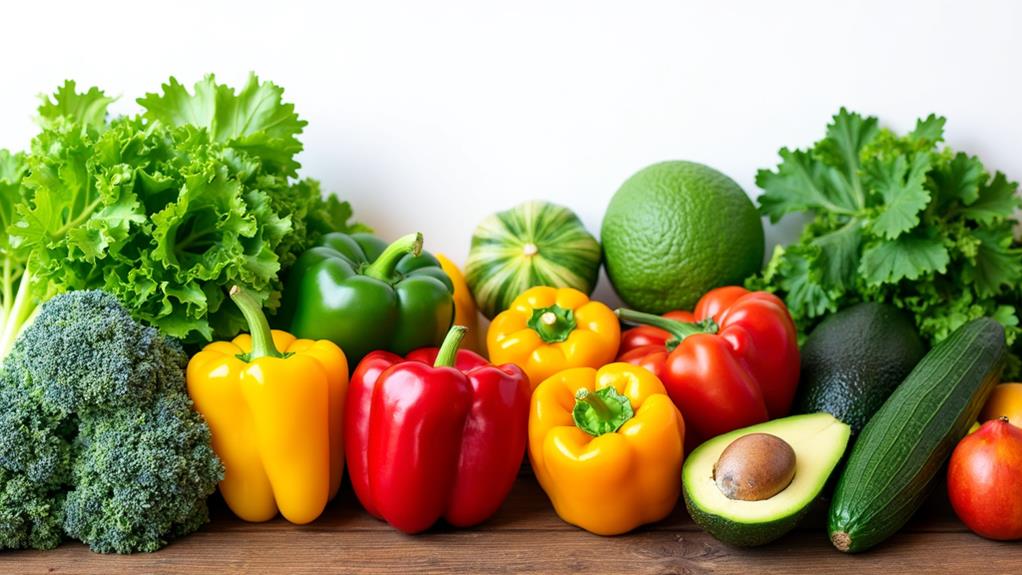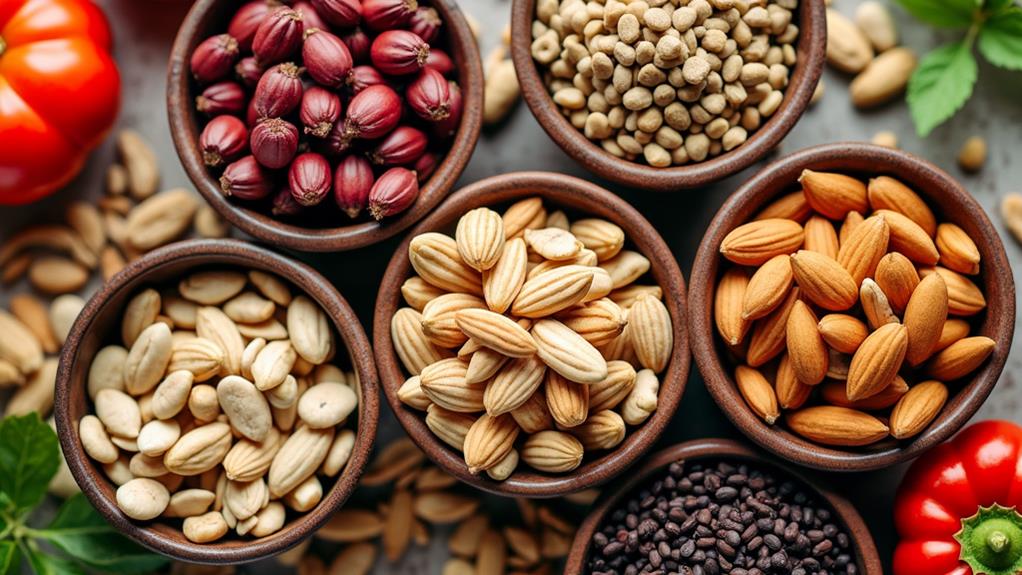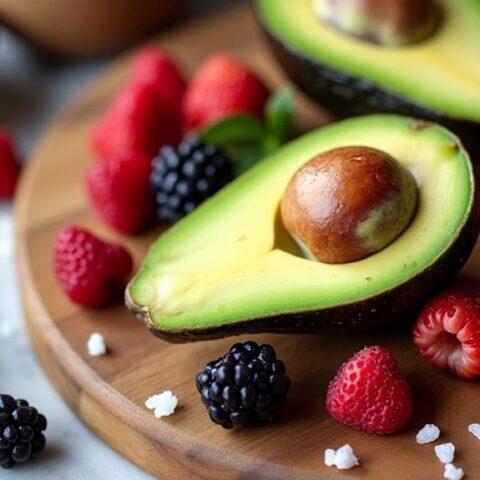
The ketogenic diet typically restricts carbohydrate intake to fewer than 50 grams of net carbs per day to maintain ketosis. Most individuals find the ideal range for achieving and sustaining ketosis is 20-30 grams of net carbs daily. Net carbs are calculated by subtracting dietary fiber and certain sugar alcohols from total carbohydrates, focusing on those that impact blood sugar levels. To accurately stay within these limits, meticulous tracking of food sources, including non-starchy vegetables, certain dairy products, and controlled portions of fruits, is vital. Understanding and monitoring these details are essential for effective keto diet adherence.
Key Takeaways
- The Keto diet restricts carbohydrate intake to fewer than 50 grams per day.
- For optimal ketosis, aim for 20-30 grams of net carbs daily.
- Net carbs are calculated by subtracting fiber and certain sugar alcohols from total carbs.
- Regular tracking of carbohydrate intake is essential to maintain ketosis.
- Avoid starchy vegetables and high-carb fruits to stay within daily carb limits.
Understanding Keto Diet Carbs
Understanding keto diet carbs is pivotal for anyone looking to adopt and succeed on the ketogenic diet. The ketogenic diet typically restricts carbohydrate intake to fewer than 50 grams per day to achieve and maintain a state of ketosis. The precise selection of carb sources becomes essential in this situation. Whole, unprocessed foods with low carbohydrate content are favored to guarantee that daily carb limits are not exceeded.
Vegetables like leafy greens and cruciferous vegetables are excellent choices due to their low net carb content and high nutrient density. Additionally, ketosis can be disrupted by excess protein intake, which underscores the importance of balancing macronutrients carefully.
A common macronutrient distribution for the keto diet is approximately 70-80% fat, 10-20% protein, and 5-10% carbohydrates. This composition underscores the critical role of minimizing carbohydrate intake to facilitate the metabolic shift towards ketosis.
Keto myths often suggest that any amount of carbohydrate intake can be permissible, but consuming too many carbohydrates can prevent the body from entering ketosis. Consequently, meticulous tracking of daily carbohydrate intake is imperative, not only to adhere to the diet but also to avoid hidden carbs that may inadvertently exceed the recommended limits.
To conclude, focusing on appropriate carb sources and dispelling keto myths are fundamental for success on the ketogenic diet.
Net Carbs Vs Total Carbs
Understanding the distinction between net carbs and total carbs is essential for those adhering to the ketogenic diet, as net carbs provide a more accurate measure of the carbohydrates that impact blood sugar levels.
By subtracting fiber and certain sugar alcohols from total carbohydrates, individuals can better manage their intake to stay below the recommended 50 grams of net carbs per day, thereby maintaining ketosis.
This approach is particularly significant in processed foods, where accounting for sugar alcohols can prevent unintended disruptions in ketosis.
Monitoring personal tolerance to sugar alcohols is also recommended to avoid digestive issues.
Net Carbs Calculation
When starting a ketogenic diet, accurately calculating net carbs becomes a vital practice to secure sustained ketosis and ideal metabolic results. The importance of understanding net carbs lies in their direct impact on your body's ability to burn fat for fuel.
Net carbs are derived by subtracting fiber and certain sugar alcohols from total carbohydrates. This calculation is essential as fiber and non-digestible carbs do not greatly affect blood sugar levels, and therefore not hindering ketosis.
To calculate net carbs, follow these steps:
- Subtract dietary fiber: Since fiber is indigestible, its presence doesn't contribute to blood sugar spikes.
- Account for sugar alcohols: For precision, subtract half the content of sugar alcohols like erythritol from the total carbs.
- Total carbs: Always start with the total carbohydrate content listed on nutritional labels.
Adhering to the recommended daily intake of less than 50 grams of net carbs is vital for maintaining ketosis.
This distinction between net carbs and total carbs helps guarantee you're consuming the right amount of absorbable and usable carbohydrates that influence insulin levels and ketosis.
As a result, understanding and applying this principle is fundamental for achieving ideal weight loss and metabolic health on the ketogenic diet.
Impact on Ketosis**
The distinction between net carbs and total carbs is vital for individuals adhering to a ketogenic diet due to its direct impact on maintaining ketosis. Net carbs, calculated by subtracting fiber and certain sugar alcohols from total carbohydrates, represent the carbohydrates that greatly affect blood sugar levels and insulin response. This measurement is important in preventing the body from exiting ketosis, a metabolic state where fat is used as the primary fuel source.
On a ketogenic diet, the recommended daily intake of carbohydrates typically ranges from 20 to 50 grams, with a focus on net carbs. Many individuals aim for a net carb limit of around 20-30 grams per day to sustain ketosis.
Keto carb sources such as non-starchy vegetables and low-carb fruits are preferred due to their lower impact on blood glucose levels.
Carbohydrate timing also plays a role in maintaining ketosis. Consuming carbs in smaller quantities throughout the day, rather than in a single large meal, can help maintain stable blood sugar levels and support prolonged ketosis.
Exceeding the net carb limit can disrupt ketosis, as the body converts excess carbohydrates to glucose, interrupting the fat-burning process essential for the ketogenic diet's efficacy.
Carbs in Meat and Fish
In the context of a ketogenic diet, meat and fish serve as fundamental components due to their minimal carbohydrate content. Most meat varieties, including beef, pork, lamb, and poultry, contain negligible carbohydrates, typically less than 1 gram per 100 grams. This makes them ideal protein sources for maintaining ketosis.
Fish types such as salmon, tuna, and mackerel are equally beneficial, with 0 grams of carbs per serving. Shellfish, including shrimp and crab, are also low-carb, averaging around 1-2 grams of carbs per 100 grams, making them suitable additions to a keto meal plan.
Additionally, sustainable sourcing is essential for ocean protection, ensuring that our dietary choices do not negatively impact marine ecosystems.
However, it is important to be mindful of processed meats like bacon and deli meats, which may contain added sugars or fillers that increase their carb content. Careful label inspection is recommended to avoid unintentional carb intake.
- Meat Varieties: Beef, pork, lamb, poultry (<1 gram of carbs per 100 grams).
- Fish Types: Salmon, tuna, mackerel (0 grams of carbs per serving).
- Shellfish: Shrimp, crab (1-2 grams of carbs per 100 grams).
Carbs in Dairy Products
While meat and fish are celebrated for their minimal carbohydrate content, dairy products present a more nuanced picture for those adhering to a ketogenic diet. Whole milk, for instance, contains approximately 11.3 grams of net carbs per cup, making it less suitable for strict keto plans. In contrast, dairy alternatives like unsweetened almond milk offer a notably lower carb content at about 1 gram per cup.
Heavy cream is another favorable option, containing roughly 0.4 grams of net carbs per tablespoon. This makes it a popular ingredient in keto recipes. Greek yogurt, especially the unsweetened variety, has around 6-9 grams of net carbs per serving, necessitating mindful portion control to maintain ketosis.
Carb conscious cheese varieties such as cheddar and mozzarella typically contain between 0.4 to 1 gram of net carbs per ounce, making them highly suitable for a ketogenic diet.
| Dairy Product | Net Carbs per Serving |
|---|---|
| Whole Milk (1 cup) | 11.3 grams |
| Unsweetened Almond Milk | 1 gram |
| Heavy Cream (1 tbsp) | 0.4 grams |
| Greek Yogurt (unsweetened) | 6-9 grams |
| Cheddar/Mozzarella (1 oz) | 0.4-1 gram |
Carbs in Vegetables

Understanding the carbohydrate content in vegetables is essential for those adhering to a ketogenic diet. Non-starchy vegetables are generally favored due to their low carbohydrate content, making them suitable for maintaining ketosis. For instance, spinach contains only 0.4 grams of net carbs per cup, while broccoli offers approximately 3.7 grams of net carbs per cup. These low carb options are ideal for those looking to stay within the strict carb limits of a ketogenic regimen.
Many keto-friendly vegetables like arugula and asparagus not only offer low carbs but also pack essential vitamins and antioxidants.
Conversely, starchy vegetables such as carrots and sweet potatoes possess higher carbohydrate contents, rendering them less suitable for ketogenic diets. A medium carrot provides around 4.1 grams of net carbs, and a medium sweet potato contains roughly 20 grams of net carbs, which can quickly exceed daily carb allowances.
Focusing on non-starchy vegetable varieties can help guarantee nutrient intake without compromising ketosis. Cauliflower, for example, is an excellent substitute for higher-carb vegetables, containing only 3.2 grams of net carbs per cup.
- Spinach: 0.4 g net carbs per cup
- Broccoli: 3.7 g net carbs per cup
- Cauliflower: 3.2 g net carbs per cup
Carbs in Fruits
Fruits, although nutritious, generally contain higher carbohydrate levels, posing a challenge for those adhering to a ketogenic diet. The key to successfully incorporating fruits into a keto regimen lies in careful fruit selection and strict portion control.
For instance, bananas, known for their high carbohydrate content, contain over 20 grams of net carbs per fruit, making them unsuitable for maintaining ketosis. Conversely, berries such as raspberries present a more keto-friendly option, with only about 1.7 grams of net carbs per ¼ cup. If you're also mindful about hidden added sugars in other foods, you can better manage your overall carb intake.
Stone fruits like peaches and plums also have higher carb counts, necessitating moderation due to their potential to greatly impact daily carb limits. In contrast, avocados are an exceptional choice for the keto diet, offering approximately 2 grams of net carbs per fruit along with a high content of healthy fats conducive to ketosis.
Despite the allowance of lower-carb fruits, the importance of portion control cannot be overstated. Even keto-friendly fruits, when consumed in larger quantities, can quickly accumulate carbs, jeopardizing the delicate balance required for ketosis.
Consequently, thoughtful fruit selection and mindful portion control are critical strategies for integrating fruits into a ketogenic lifestyle effectively.
Carbs in Nuts and Seeds

Nuts and seeds are a staple in many ketogenic diets due to their generally low carbohydrate content and high nutritional value. However, the carb content varies among nut varieties, making it vital to choose wisely and monitor serving sizes.
For instance, macadamia nuts contain approximately 1.5 grams of net carbs per ounce, whereas cashews have a notably higher count at around 8.4 grams per ounce. Almonds, a popular choice for keto enthusiasts, offer about 2.9 grams of net carbs per ounce. Additionally, incorporating non-starchy vegetables into your diet can further enhance your nutritional intake while keeping carb counts low.
Certain seeds also present excellent options for those on a keto diet. Chia seeds, for example, contain approximately 1.2 grams of net carbs per ounce and provide considerable fiber, which further reduces net carb counts.
Walnuts and pecans are equally keto-friendly, with walnuts containing around 2 grams of net carbs per ounce and pecans approximately 1.1 grams.
- Macadamia nuts: 1.5 grams of net carbs per ounce
- Chia seeds: 1.2 grams of net carbs per ounce
- Almonds: 2.9 grams of net carbs per ounce
Consequently, it is important to track portion sizes when consuming these nut varieties to guarantee adherence to the ketogenic diet's carb limits.
How Many Carbs for Ketosis
To achieve ketosis, daily carbohydrate intake should generally be limited to under 50 grams, with many experts recommending 20-30 grams for ideal results.
This restriction necessitates calculating net carbs, which are total carbohydrates minus fiber and certain sugar alcohols, to understand the actual impact on ketosis.
Regular tracking of carbohydrate intake is essential to avoid miscalculating net carbs, as this can lead to unintended excessive carbohydrate consumption.
Accurate tracking of carbohydrate consumption, often through apps or food diaries, is essential for maintaining these limits and ensuring the body uses fat rather than glucose as its primary energy source.
Daily Carb Limit
Achieving and maintaining a state of ketosis on a ketogenic diet necessitates strict regulation of daily carbohydrate intake, typically restricting it to between 20 and 50 grams. For most individuals, a common target hovers around 25 grams of net carbs per day, calculated by subtracting fiber from total carbohydrates. This meticulous limitation is vital, as exceeding the recommended carb threshold can prevent the metabolic shift from glucose to fat as the primary energy source.
Effective management of carbohydrate intake involves paying careful attention to both carb sources and carb timing. Prioritizing high-fiber, low-carb foods such as leafy greens and non-starchy vegetables is fundamental to maximize nutrient intake while adhering to dietary restrictions.
Food tracking apps are frequently employed to monitor daily consumption and guarantee compliance with the carb limits.
- Carb Sources: Opt for nutrient-dense, low-carb vegetables and avoid high-carb foods like grains and sugars.
- Carb Timing: Distribute your carb intake evenly throughout the day to maintain stable blood sugar levels.
- Monitoring Tools: Utilize food tracking apps to keep a precise record of your carbohydrate consumption.
Maintaining these practices helps guarantee that the body remains in ketosis, optimizing the benefits of the ketogenic diet.
Net vs. Total Carbs
Understanding the distinction between net carbs and total carbs is vital for anyone adhering to a ketogenic diet. On the ketogenic diet, maintaining ketosis typically requires limiting carbohydrate intake to 20-50 grams of net carbs per day.
Net carbs are calculated by subtracting fiber and certain sugar alcohols from total carbohydrates because these components do not greatly impact blood sugar levels.
For effective ketosis, it is important to focus on whole, unprocessed foods, primarily non-starchy vegetables and small amounts of berries. These carb sources help to stay within the carb limits and provide essential nutrients.
Total carbs encompass all carbohydrates present in food, but only net carbs are considered for tracking purposes within the ketogenic framework.
Careful attention to nutrition labels is necessary to determine both total and net carb content. This vigilance guarantees adherence to ketogenic guidelines and prevents accidental overconsumption of carbohydrates.
Additionally, understanding carb timing can optimize ketosis; distributing carb intake throughout the day rather than consuming large amounts at once can help maintain stable blood sugar levels.
Monitoring Carb Intake
Accurately monitoring carbohydrate intake is pivotal for the success of a ketogenic diet. The standard recommendation is to limit daily carbs to 20-50 grams, with a focus on staying below 50 grams to maintain ketosis.
Effective carb tracking involves calculating net carbs by subtracting fiber and certain sugar alcohols from total carbohydrates, as net carbs are what impact ketosis. This precise monitoring helps in maintaining the ideal macro ratios essential for the ketogenic diet's effectiveness.
To guarantee precise carb tracking, utilizing food tracking apps can be invaluable. These apps help in identifying hidden carbs, especially in processed foods where hidden sugars can often lurk.
Diligent reading of nutrition labels is essential, as many seemingly low-carb items may contain sugars that contribute to the overall carb count.
Regularly testing for ketosis using urine strips or blood ketone meters can provide feedback on whether your carb intake is effectively maintaining ketosis.
- Use food tracking apps: These help in accurate carb tracking and identifying hidden sugars.
- Read nutrition labels diligently: Uncover hidden sugars that may disrupt ketosis.
- Test for ketosis regularly: Use urine strips or blood ketone meters to monitor your body's state.
Frequently Asked Questions
How Many Carbs Can I Eat and Stay in Ketosis?
To remain in ketosis, keto carb limits typically require restricting carbohydrate intake to 20-50 grams per day. Individual tolerance varies, so monitoring ketosis levels through urine strips or blood ketone meters is essential for accurate carbohydrate management.
Can You Lose Weight on 50 Carbs a Day?
Yes, weight loss is achievable with a daily intake of 50 carbs. Evidence indicates that maintaining this level can induce ketosis, promote fat utilization, and suppress appetite-stimulating hormones. Carb cycling may further enhance these weight loss benefits.
Can You Eat 100 Carbs on Keto?
Consuming 100 grams of carbohydrates daily on a ketogenic diet typically prevents ketosis. However, keto flexibility may allow for varied carb sources, but such intake generally hinders the metabolic state essential for effective ketosis.
How Many Carbs to Be Kicked Out of Ketosis?
The keto carbohydrate threshold varies, with most individuals kicked out of ketosis after consuming over 50 grams of net carbs. Individual carb tolerance differs, necessitating personalized monitoring to maintain ketosis and optimize dietary adherence.
Conclusion
To conclude, the ketogenic diet necessitates strict carbohydrate regulation, focusing primarily on net carbs rather than total carbs. Meat and fish generally contain negligible carbs, while dairy, vegetables, fruits, nuts, and seeds vary greatly in their carbohydrate content. Achieving and maintaining ketosis typically requires limiting daily carbohydrate intake to 20-50 grams. Continuous monitoring and precise calculation of carb intake are essential for the successful adherence to and effectiveness of the ketogenic diet.










No Comments